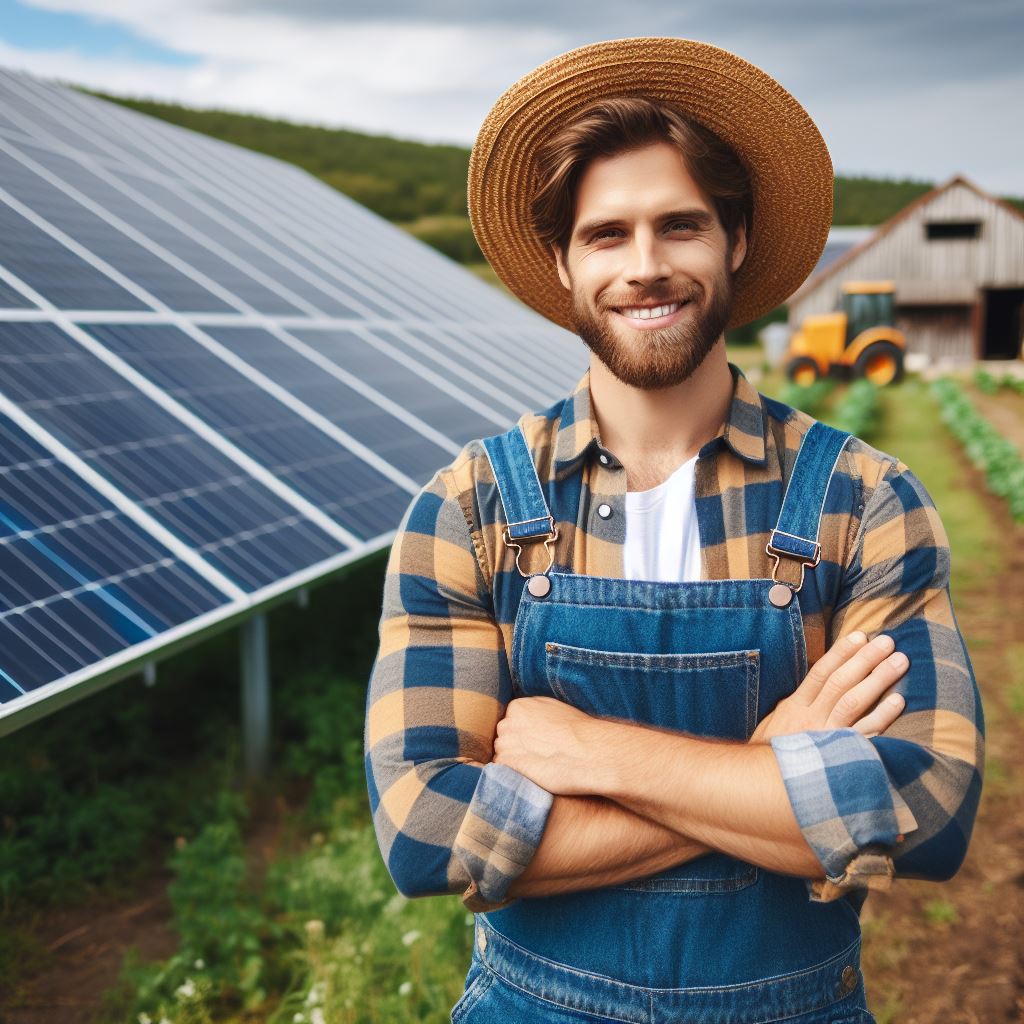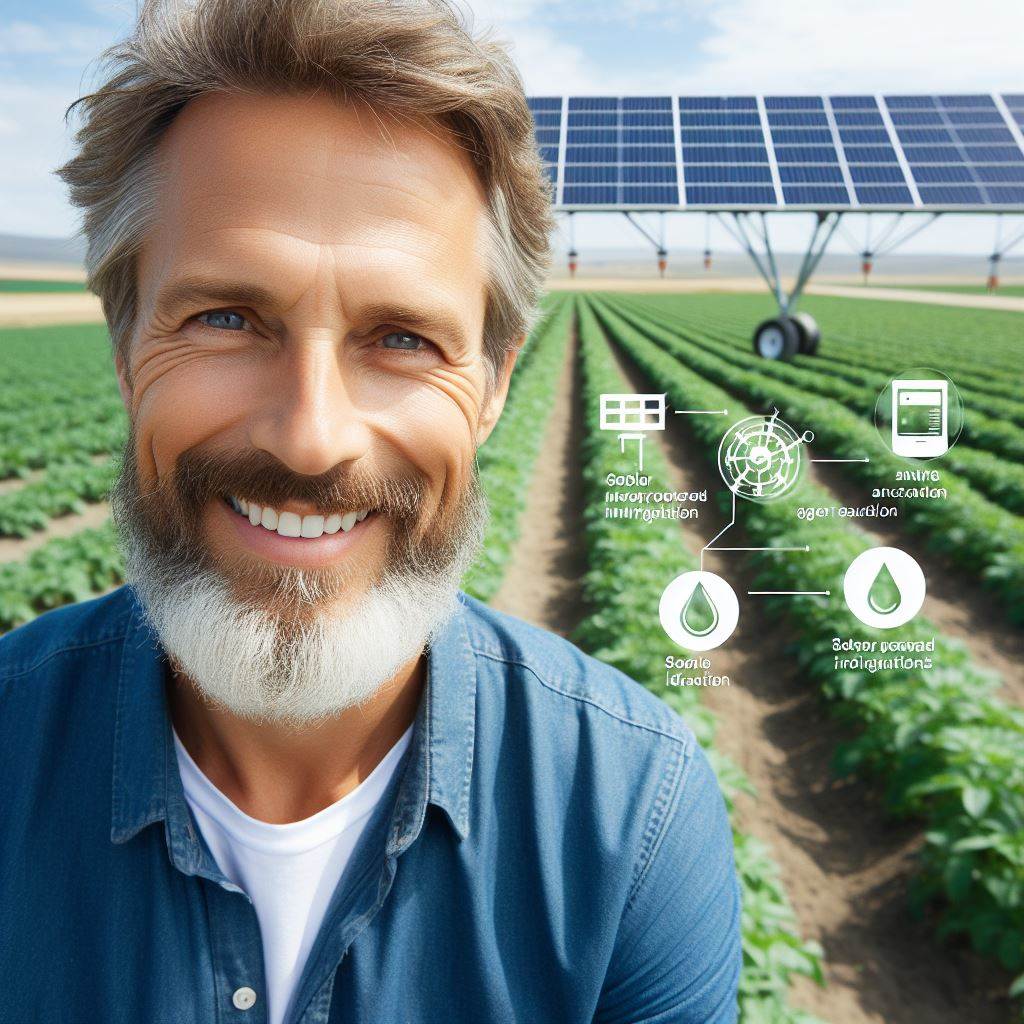Introduction
In today’s world, sustainable energy sources play a crucial role in preserving our planet’s resources and combating climate change.
One such source that has gained significant attention is solar energy.
Solar power not only provides a clean and renewable energy source but also offers unique benefits when combined with farming practices.
This blog post explores the perfect match between farming and solar energy and how it can revolutionize agricultural practices.
Firstly, it is essential to understand the role of sustainable energy sources in reducing greenhouse gas emissions and promoting a greener future.
Solar energy, obtained from the sun, is abundant and can be harnessed to generate electricity without harmful emissions or depletion of finite resources.
By embracing solar power, farmers can contribute to a more sustainable planet.
The concept of farming and solar energy as a perfect match lies in the land resources available on farms. Often, farms have vast open spaces that are ideal for installing solar panels.
These solar panels can generate electricity to power the farm operations while reducing dependence on traditional energy sources.
Additionally, the excess electricity produced can be sold back to the grid, creating an additional revenue stream for farmers.
In this blog post, we will delve into the advantages of combining farming and solar energy, such as reducing energy costs, promoting energy independence, and positively impacting the environment.
We will also discuss the challenges and considerations that farmers need to be aware of when implementing solar energy systems on their farms.
Overall, embracing solar energy in farming practices presents a powerful solution to promote sustainability and address energy needs.
By exploring the perfect match between farming and solar energy, we can pave the way for a more environmentally friendly and prosperous future in agriculture.
Stay tuned for our upcoming blog posts as we dive deeper into this fascinating topic.
Transform Your Agribusiness
Unlock your farm's potential with expert advice tailored to your needs. Get actionable steps that drive real results.
Get StartedBenefits of Using Solar Energy in Farming
Farming and solar energy are a perfect match. The integration of solar power systems in agricultural practices has brought numerous benefits to farmers.
In this section, we will explore the advantages of using solar energy in farming.
Reduced Energy Costs
The use of solar energy in farming can significantly reduce electricity costs.
Solar power systems generate clean and renewable energy, allowing farmers to rely less on traditional energy sources, such as fossil fuels.
By harnessing the power of the sun, farmers can produce their electricity, eliminating the need to purchase electricity from the grid.
Several farmers have embraced solar energy and have experienced substantial cost savings. For example, John, a dairy farmer, installed solar panels on his barn roof.
As a result, he reduced his electricity bill by 70%. The solar panels generate enough energy to power the barn’s cooling and milking systems, minimizing the farm’s reliance on the electrical grid.
Environmental Sustainability
Solar energy has a positive impact on reducing the carbon footprint of farming operations.
Traditional energy sources, such as coal and natural gas, release harmful greenhouse gases when burned for electricity production.
In contrast, solar energy is clean and does not emit any pollutants during the generation process.
Furthermore, solar energy plays a crucial role in addressing climate change and preserving the environment.
By shifting towards renewable energy sources like solar power, farmers contribute to reducing greenhouse gas emissions and mitigating the adverse effects of climate change.
This sustainable approach ensures a healthier planet for future generations.
Increased Self-Sufficiency
One of the significant benefits of solar energy in farming is the increased self-sufficiency it offers to farmers.
By installing solar panels on their land or infrastructure, farmers can generate their electricity.
This independence from the electrical grid provides security and stability, especially during power outages or fluctuations.
Relying on renewable energy sources for electricity needs also brings reliability and resilience to farming operations.
Unlike traditional energy sources, such as fossil fuels, solar energy is abundant and accessible in most regions.
This accessibility ensures a consistent and uninterrupted power supply, enabling farmers to carry out their activities without any hindrance.
In short, the benefits of using solar energy in farming are undeniable.
Farmers can enjoy reduced energy costs, contribute to environmental sustainability, and achieve increased self-sufficiency in their operations.
Embracing solar power systems not only improves the bottom line but also shows a commitment to a greener and more sustainable future in agriculture.
Read: Biomass Use in Eco-Agriculture
Practical Applications of Solar Energy in Farming
Solar water pumping
Solar energy’s integration with farming extends beyond fields, offering sustainable solutions like solar water pumping.
Showcase Your Farming Business
Publish your professional farming services profile on our blog for a one-time fee of $200 and reach a dedicated audience of farmers and agribusiness owners.
Publish Your Profile- Irrigation Powerhouse: Solar energy empowers water pumps, ensuring efficient irrigation for crops, aligning agriculture with eco-friendly practices.
- Advantages Galore: Solar-powered water pumping systems bring economic benefits, reducing operational costs and environmental impact while enhancing overall farm productivity.
Solar-Powered Electric Fences
Electric fences are a staple in modern farming, ensuring security and livestock management, where solar energy plays a pivotal role.
- Fencing Necessity: Electric fences safeguard crops and livestock, deterring wildlife and unauthorized entry, vital for a thriving farming ecosystem.
- Solar Brilliance: Leveraging solar power for electric fences not only enhances reliability but also reduces dependence on conventional energy sources, fostering sustainability in farming practices.
Solar-Powered Ventilation Systems
In the realm of agricultural infrastructure, proper ventilation is paramount, and solar energy emerges as a game-changer.
- Air Quality Imperative: Agricultural buildings demand optimal ventilation to maintain air quality. Solar-powered ventilation systems address this need efficiently.
- Solar Air Solutions: By harnessing solar energy, ventilation systems become sustainable, reducing energy costs and environmental impact while ensuring a conducive environment for both crops and livestock.
In the intricate tapestry of farming, the strategic adoption of solar technology emerges as a transformative force, revolutionizing the way agricultural operations are conducted.
Solar water pumping stands as a beacon of sustainability, allowing farmers to harness the sun’s power for precision irrigation.
This eco-friendly approach not only conserves resources but also contributes to the overall health of the environment.
Electric fences powered by solar energy redefine the concept of security in farming.
Beyond protecting assets, these fences operate reliably, minimizing costs and environmental impact, reflecting a commitment to responsible agriculture.
The marriage of solar energy and ventilation systems addresses the core need for proper air circulation in agricultural buildings.
This symbiotic relationship enhances efficiency, reduces operational costs, and underscores the commitment of farmers to sustainable practices.
As farmers embrace these practical applications of solar energy, they not only fortify their operations against the challenges of a dynamic climate but also contribute to a more sustainable and eco-conscious agricultural landscape.
The future of farming is illuminated by the sun, as solar technology continues to forge a perfect match with the evolving needs of the agriculture sector.
Read: Harness Wind: Sustainable Farming

Case Studies: Success Stories in Farming and Solar Energy
Successful farm businesses that have integrated solar energy
- Tom’s Organic Farm in California has effectively implemented a solar energy system, reducing their dependency on traditional energy sources.
- Green Acres Farm in Wisconsin installed solar panels that power their irrigation system, cutting down on electricity costs.
- Robertson Family Farms in Oregon has benefited from solar energy, generating enough power to meet their entire farm’s needs.
The economic and ecological advantages of farming and solar energy synergy
- By incorporating solar energy, Tom’s Organic Farm has witnessed a significant increase in profitability due to reduced energy costs.
- Green Acres Farm’s switch to solar energy has not only lowered their bills but also reduced their carbon footprint, contributing to a cleaner environment.
- Robertson Family Farms’ commitment to sustainability through solar energy has garnered positive attention from consumers, resulting in increased sales.
Read: Eco-Friendly Farms with Solar Tech
Challenges and Considerations in Implementing Solar Energy on Farms
Implementing solar energy on farms comes with challenges that need careful consideration and planning.
This section will delve into some of the challenges and considerations farmers may face when installing and maintaining solar energy systems on their farms.
Upfront costs and financial considerations
One of the primary challenges for farmers looking to harness the power of solar energy is the significant upfront costs associated with installing the necessary systems.
Investing in solar panels, inverters, batteries, and other equipment can be expensive.
However, it is essential to recognize that these costs can be offset by long-term energy savings and potential incentives.
Several financing options are available to farmers to help cover the initial investment.
Government grants, loans, and leasing arrangements can ease the financial burden and make solar energy more affordable.
Additionally, various incentive programs, such as tax credits and feed-in tariffs, may further incentivize farmers to switch to solar energy, providing them with reduced electricity costs and potential income from excess energy production.
Technical considerations and system maintenance
While the financial aspect is crucial, the successful implementation of solar energy on farms also depends on technical considerations and maintenance requirements.
Farmers need to possess the necessary technical knowledge and expertise to ensure the proper installation and functioning of solar energy systems.
Before installing solar panels, it is vital to assess the farm’s solar potential, considering factors like available roof or ground space, shading, and orientation.
This assessment can help determine the optimal system size and configuration for maximum electricity production.
Maintenance is another key consideration. Solar panels require regular cleaning to remove debris and optimize their efficiency.
Additionally, monitoring the system’s performance and promptly addressing any technical issues is crucial.
Farmers should have a plan in place to ensure regular maintenance and access to technical support.
Challenges in system maintenance can arise, such as dealing with potential faults or failures.
In some cases, extreme weather conditions or natural events may damage panels or other components.
Prompt repair or replacement is necessary to avoid prolonged downtime and maximize energy production.
Another potential challenge is ensuring the consistent and efficient functioning of the solar energy system.
Monitoring energy generation and consumption, along with battery storage, may require additional technological solutions.
It is crucial to have systems in place that allow farmers to track their energy usage and adjust accordingly to optimize the benefits of solar energy.
In a nutshell, implementing solar energy on farms is not without its challenges and considerations.
Farmers must carefully evaluate the upfront costs, explore financing options, and be aware of potential incentives.
Moreover, technical knowledge and expertise are vital for proper installation and effective system maintenance.
By overcoming these challenges, farmers can benefit from the long-term financial savings and environmental advantages that solar energy offers.
Read: Biomass: Farming Renewable Resource
Conclusion
This blog post highlighted the perfect match between farming and solar energy.
Showcase Your Farming Business
Publish your professional farming services profile on our blog for a one-time fee of $200 and reach a dedicated audience of farmers and agribusiness owners.
Publish Your ProfileWe have reiterated the numerous benefits and suitability of solar energy in agriculture, such as cost savings and environmental sustainability.
We strongly encourage farmers to seriously consider integrating solar energy into their farming practices to enhance productivity and reduce reliance on traditional energy sources.
For further information and resources on this topic, check out the following references:
- “Solar Energy for Agriculture: A Guide for Farmers” – USDA
- “The Benefits of Solar Panels on Farms” – National Farmers’ Union
- “Solar Power in Agriculture: Colorado Case Study” – National Renewable Energy Laboratory
Together, let’s embrace the power of the sun and revolutionize the modern farming industry with clean and sustainable solar energy solutions.




